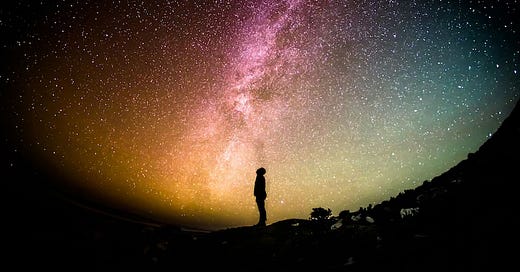Many have called it a “shock and awe” campaign—this recent barrage of destructive actions coming from Washington, D.C.
Tellingly, that phrase was first used to describe a wartime strategy intended to inspire fear and the quick collapse of opposition.
But shocking though these early days of 2025 may be, what we are witnessing has precious little to do with awe.
Awe is healing. Awe is humble. Awe tends to evoke kindness and a desire to protect.
Perhaps most importantly, awe may be just what we need to strengthen our capacity to navigate and respond to this profoundly challenging moment and those to come.
After all, a true sense of awe is not only about enjoying time in nature, though it is often inspired by that.
“In moments of crisis, awe can be a psychological reset button, shifting us away from fear and toward possibility,” Dacher Keltner writes in Awe: The New Science of Everyday Wonder and How It Can Transform Your Life.
Why new external challenges call for new internal capacities
It perhaps goes without saying that our capacity to meet the new challenges before us—as individuals, in families, or the workplace—requires multiple levels of attention.
We clearly need leaders (and lawyers!) to respond quickly and strategically to the unprecedented attacks on climate action and D.E.I., education and health, immigrant rights and trans rights, not to mention democracy itself.
However, we also need ways to respond to the psychological effects on us, our families, and our teams.
After all, we live in an age of Polycrisis, or multiple crises seemingly happening everywhere all at once. That is one reason why burnout, despair, and disengagement have been high for years.
Given the extreme escalation of complexities in 2025, that risk is all the more significant.
It’s like that moment in Jenga when you wonder, Is this the block that will make it all tumble down?
This is one of many reasons why mission-driven individuals and organizations must strengthen their internal capacity to meet growing external challenges.
As psychologist Mihaly Csikszentmihalyi, author of Flow, wrote years ago, our optimal engagement in the world occurs when a balance is “struck between the challenge of the task and the skill of the performer.”
In short, as the challenge before us grows, so must our skills.
What awe has to do with it
Creating opportunities to experience awe is one of many answers available to us—because it opens us to new possibilities.
It also helps us, as Keltner writes, “feel part of a larger whole.” In a time orchestrated to make us feel separate and alone, that is a wise and powerful act.
You likely know what sparks awe for you. Maybe it’s time in nature, art, music, watching a child meet the world with wonder, or something else.
The trick is to remember to give yourself opportunities to experience it.
One strategy that can help is what experts describe as “habit stacking.” For example, whenever there is yet another triggering “shock and awe” headline, you might think: Have I experienced a moment of authentic awe lately?
For those engaged in mission-driven causes, it is also helpful to recognize that awe can come from uniting around purpose.
“You don’t need to climb a mountain or see the Grand Canyon to feel awe,” Keltner writes—“it’s found in moments of kindness, in the courage of others, in the collective energy of people coming together for a common purpose.” (Italics mine.)
Part of the ordinary hero’s journey
I have been a lifelong student of how everyday people rise to daunting challenges—or ordinary heroism in extraordinary times.
As a result, I have learned that understanding where you are in the journey—from knowing your quest to navigating obstacles to returning with lessons learned that can inspire others—helps advance clarity, courage, and impact.
If you want to learn more about how this work can help you or your team, please schedule a free discovery call. I’d be happy to chat.





Thank you so much. I love your article. Because at this moment there is a lot of uncertainty and fear, and know that connect with my inner peace is more important is healing. It is also important knowing yourself for example I like to go a hike, dance, practice yoga, eat açaí bowl or connect with a friend.
I so appreciate you sharing this, Manuela. I do believe inner peace comes first and that healing ripple effects can flow from that. We just never know who we might inspire to do something to right wrongs and help others along the way. We can also sustain ourselves this way, which is so important--both for shining a light for others and fortifying ourselves to lend a helping hand.